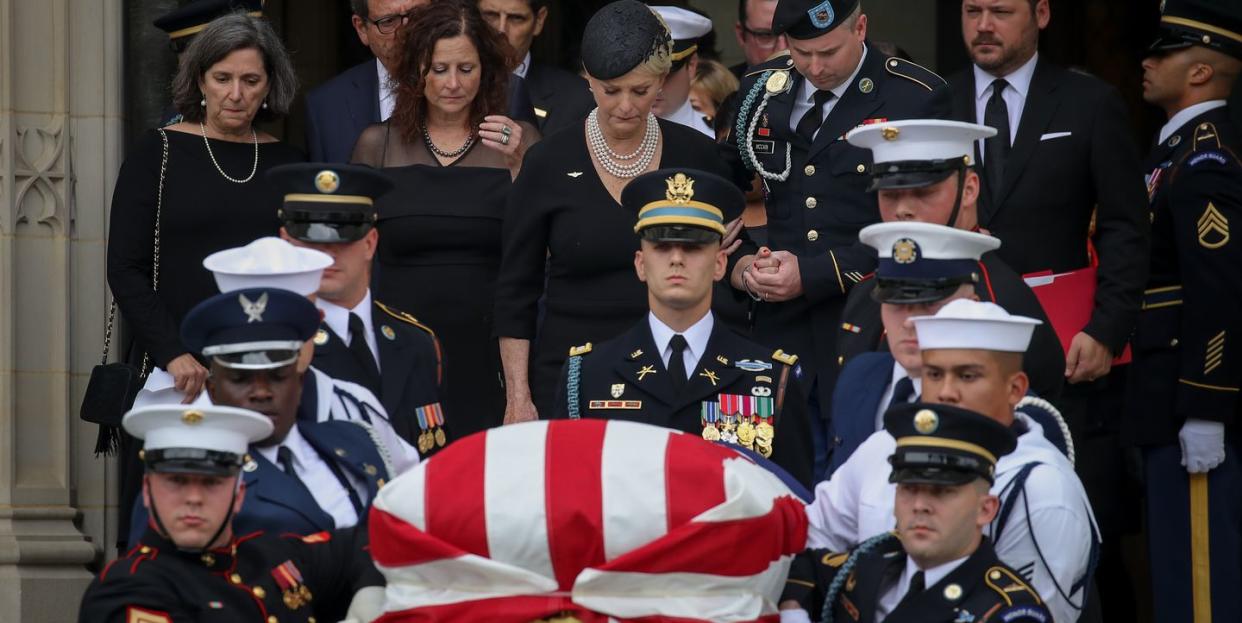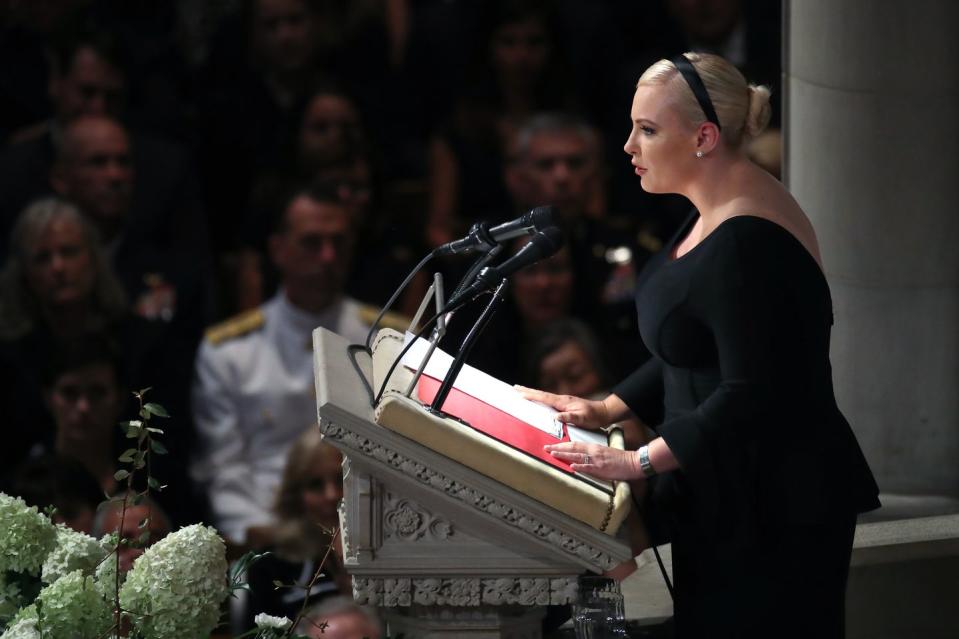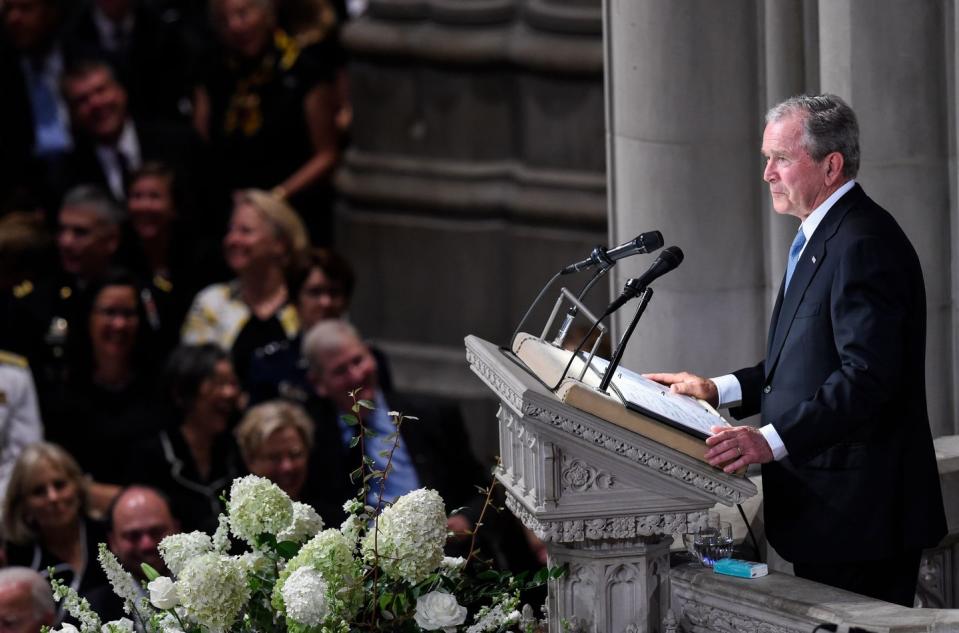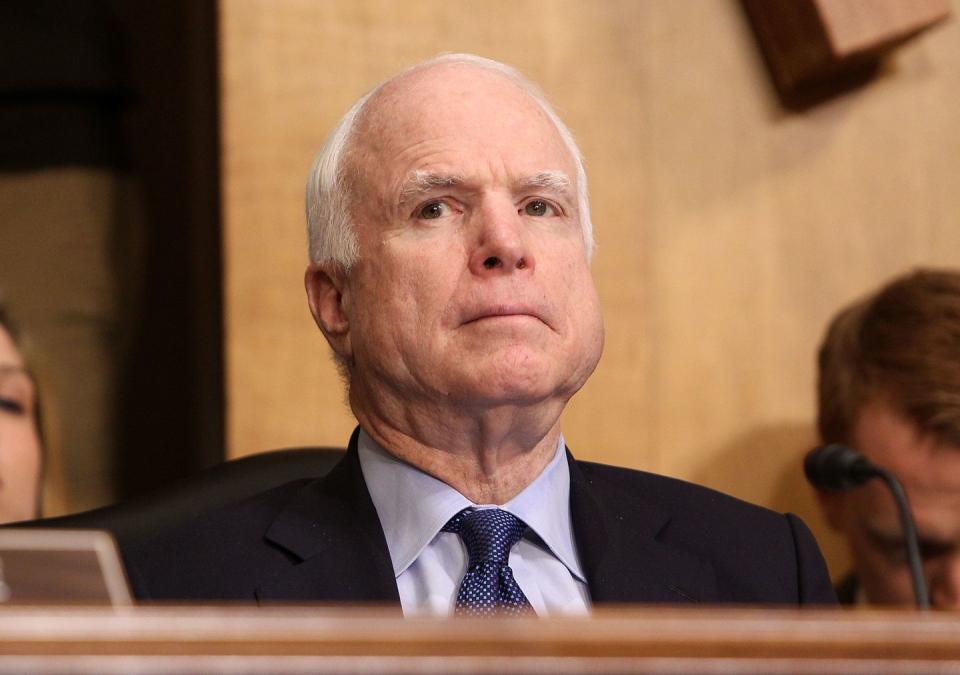John McCain’s Funeral Was a Counsel of War—Just as He Meant It to Be

"Yet somewhere under starlight or the sun, My father stands.
Aged, worn out with wars
On foot on horseback or in battle-cars.
I only ask what way my journey lies,
For He who made you bitter made you wise."
-- Cuchulain's Fight With The Sea, W.B. Yeats
WASHINGTON - In the magnificent, lordly church-house, there were speeches and prayers. There were songs and hymns. There were bands and pipers and choirs and soloists. John McCain was given a national send-off in a National Cathedral and there was a great gathering of emotion that was almost frightening in its intensity because you knew that it was aimed at a solitary, angry, unbalanced man left back at the White House, at someone who nonetheless is the president* of the United States, with all the powers inherent to his office, a man who has created a situation in which he is an object of dislike and disrespect, because that is all that he's given to the world in return.
It was said almost immediately after the conclusion of the funeral ceremonies on Saturday that, for a few hours anyway, we were back in a familiar country with familiar customs and manners and norms, a country with institutions built to last. That may well be true. I felt it, too. But in back of that is the realization that all of us, including the deceased, had taken those customs, manners, norms, and institutions terribly for granted. We thought they could withstand anything, even a renegade president* in the pocket of a distant authoritarian goon. We let the customs, manners, norms and institutions weaken through neglect and now we are in open conflict with an elected president and, make no mistake about it, John McCain's funeral was a counsel of war, and it was a counsel of war because that's what John McCain meant it to be.
He deliberately made known to people that the president* was not welcome at any of the services. He deliberately chose the previous two presidents to deliver the formal eulogies. He deliberately created that scene in the Capitol rotunda at which Mitch McConnell, Paul Ryan, and Mike Pence, an unholy trio of Trumpist quislings, had to choke down their own cowardice and say how much they loved him and his irascibility. He deliberately created a mirror in which, if they still have an ounce of self-awareness, they could see the rot that has set in on their souls. Even at the end, John McCain knew what he was doing and he was a fearsome opponent. He wanted a pageant of everything this administration* has trashed and put up for sale, and that's what he got Saturday-a morality play shot through with Shakespearian portent and foreshadowing, a pageant of democracy's vengeance.
This is not to minimize the genuine affection and love that was on display. John McCain was a beloved figure to many of the people who came to bid him farewell. But there was so much subtext under the proceedings that the mantle shattered, and subtext became text, plain as the rain that fell and passed while the service continued. This was a funeral with more than one purpose-to celebrate the passing of John McCain and to summon a rebirth of politics that did not so much reek of grift and vodka.
We gather to mourn the passing of American greatness, the real thing, not cheap rhetoric from men who will never come near the sacrifice, those that live lives of comfort and privilege while he suffered and served. He was a great fire who burned bright. In the past few days, my family and I have heard from so many of those Americans who stood in the warmth and light of his fire and found it illuminated what's best about them. We are grateful to them because they're grateful to him. A few have resented that fire for the light it cast upon them for the truth it revealed about their character, but my father never cared what they thought and even that small number still have the opportunity as long as they draw breath to live up to the example of John McCain.
The America of John McCain has no need to be made great again, because America was always great.
And here the transcript reads: (Applause).

Thus said George W. Bush, who I believe has a new writer who deserves a raise:
Perhaps above all John detested the abuse of power, could not abide bigots and swaggering. He spoke up for the little guy, forgotten people in forgotten places. One friend from naval academy days recalls John reacted to seeing an upperclassman verbally abuse a steward. Against all tradition, he told the jerk to pick on someone his own size. It was a familiar refrain during the six decades of service.

And thus said Barack Obama, who confessed to being initially surprised at being asked to speak:
John cared about the institutions of self-government, our Constitution, our Bill of Rights, rule of law, separation of powers, even the arcane rules and procedures of the Senate. He knew that in a nation as big and boisterous and diverse as ours, those institutions, those rules, those norms are what bind us together. They give shape and order to our common life, even when we disagree. Especially when we disagree.

Make no mistake. Those are not patriotic banalities any more. The current president* has made them dead serious again. They are no longer frothy paeans to the greatness of America. They are compass points on a battlefield. They are no longer heard with half an ear and then forgotten. They are fighting words now. The president* knew it. That's why he spent the morning rage-tweeting and the afternoon playing golf. In dying, and in carefully planning his funeral in the way he did, John McCain has opened a second front.
In 1998, when I was traveling with McCain for a profile that ran in this magazine, I asked him if there was anyone involved with the Vietnam War that he couldn't bring himself to forgive. By then, he had made his peace with the antiwar movement; he delivered the eulogy for an antiwar activist whose speeches from Hanoi had been piped into his cell. He-along with John Kerry-had succeeded in normalizing relations between the United States and Vietnam. He had taken Walter Cronkite on a tour of his old prison. He'd even forgiven the guards who'd beaten and tortured him. A couple of years earlier, former Secretary of Defense Robert McNamara, one of the architects of that bloody misadventure, had written a memoir in which he confessed that he'd known the war was unwindable as early as 1967, but that he had kept his mouth shut while the country slid more swiftly toward disaster. As it happens, October 26, 1967 was the day that John McCain's fighter jet had taken an anti-aircraft missile over Hanoi. So I asked him if there was someone he couldn't forgive, or at least talk to, about that awful time. He got all quiet and took a long time to answer.
"McNamara," he finally said. "That's the worst to me-to know you've made a mistake and to do nothing to correct it while, year after year, people are dying and to do nothing to stop it, to know what your public duty is and to ignore it. I don't think any conversation we could have would be helpful now."

One image will stay with me as this weekend comes to an end and we all walk back into politics as they are now. It was Friday afternoon and various important people were paying their respects in the rotunda, their ranks formed by what they did for a living. Senators with senators. House members with House members. The members of the executive filed in by department. As the members of the Department of Justice paid their respects, Rod Rosenstein, the embattled deputy attorney general who is overseeing Robert Mueller's investigation, walked by the assembled members of the House of Representatives, and he winked at someone among them. Something inexorable began this weekend, and that's what John McCain had in mind all along.
Respond to this post on the Esquire Politics Facebook page here.
('You Might Also Like',)

